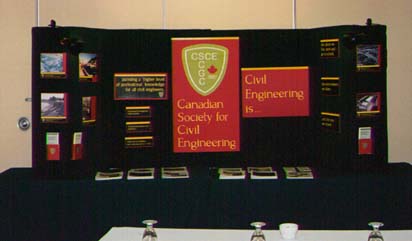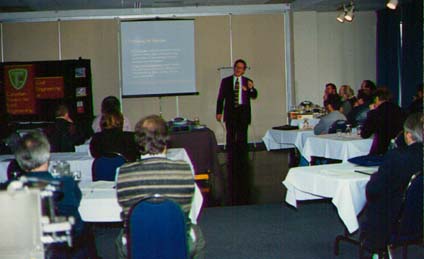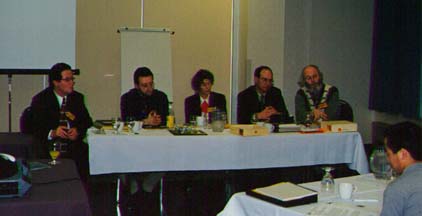

 "Wetlands
are an important part of the Canadian landscape. They cover about
16% of the nation's land surface - that's more than every other
country on Earth, except Russia. Even in pre-confederation Newfoundland,
prime ministers recognized the prevalence of wetlands; one described the
colony's chief attributes as 'hogs, fogs, bogs, and dogs.'
"Wetlands
are an important part of the Canadian landscape. They cover about
16% of the nation's land surface - that's more than every other
country on Earth, except Russia. Even in pre-confederation Newfoundland,
prime ministers recognized the prevalence of wetlands; one described the
colony's chief attributes as 'hogs, fogs, bogs, and dogs.'
Originally, Wetlands in this country were thought
of as valueless wastelands, and much wetland was drained or otherwise destroyed.
In recent years, this view has changed. Wetlands are now seen as
a vital link in a healthy environment and ecosystem. Many governments,
companies, individuals and private organizations are working to preserve
and protect the remaining wetlands, and to restore wetlands that have been
damaged by human activity."
-- excerpt from our pamphlet on Engineered Wetlands
The workshop focused on definitions and classifications of natural,
restored, and created wetlands. Values and uses of natural and created
habitat, treatment, and water quality control wetlands were major themes
at the workshop. Created wetland project planning, maintenance and
monitoring were examined using selected case studies. We also had
the distinct pleasure of having four local speakers in addition to our
keynote speaker. They profiled the local activities of North American
Waterfowl Management Plan and the Eastern Habitat Joint Venture.
Approximately 27 people spent the day with these five experts learning
about constructed wetlands.
 This is Dr.
Barry Warner, professor of biology, earth sciences and geography at the
University of Waterloo, and the Director of the Wetlands Research Centre
at the University of Waterloo, giving one of his afternoon talks.
Dr. Warner sits on many national and international committees dealing with
wetland issues and research. He teaches courses on wetlands at the
undergraduate and graduate levels and has presented short courses on the
topic all over North America. His research efforts concentrate on
the ecosystem dynamics of natural, restored, and constructed wetlands,
and the causes and consequences of change with particular emphasis on peatlands.
This is Dr.
Barry Warner, professor of biology, earth sciences and geography at the
University of Waterloo, and the Director of the Wetlands Research Centre
at the University of Waterloo, giving one of his afternoon talks.
Dr. Warner sits on many national and international committees dealing with
wetland issues and research. He teaches courses on wetlands at the
undergraduate and graduate levels and has presented short courses on the
topic all over North America. His research efforts concentrate on
the ecosystem dynamics of natural, restored, and constructed wetlands,
and the causes and consequences of change with particular emphasis on peatlands.
 Mr. Gerry
Yetman addresses an audience question during the mid-afternoon panel discussion.
(L-R) Dr. Barry Warner, Mr. Derek Osborne, Ms. Susan Richter, P. Eng. (Moderator),
Mr. Terry Fleet, and Mr. Gerry Yetman.
Mr. Gerry
Yetman addresses an audience question during the mid-afternoon panel discussion.
(L-R) Dr. Barry Warner, Mr. Derek Osborne, Ms. Susan Richter, P. Eng. (Moderator),
Mr. Terry Fleet, and Mr. Gerry Yetman.
Some Info About our speakers:
Terry Fleet possesses a B.Sc. degree
in Physical Geography, conferred in 1986. He has worked as a Military Engineering
Officer with the Canadian Forces where he completed training at the Canadian
Forces School of Military Engineering in Chilliwack, B.C. He subsequently
worked for the Water Resources Division of the Newfoundland Department
of Environment and Lands. He is presently employed as an Agricultural Drainage
Specialist with the Department of Forest Resources and Agrifoods.
Susan Richter is a professional
engineer specializing in hydrology and hydrotechnical engineering.
She presently works for Acres International in St. John's as the Senior
Hydrotechnical Engineer. She possesses Bachelors and Masters degrees
in Civil Engineering from Memorial University in St. John's.
Derek Osborne possesses a B.Sc.
(Honours) in biology from Memorial University. He has been involved
with wetland conservation and enhancement, specifically municipal stewardship
and beaver pond enhancement. He has worked with Ducks Unlimited and
the Eastern Habitat Joint Venture, where he currently works as a Wetlands
Biologist.
Gerry Yetman was a technical coordinator
at the Memorial Univeristy Botanical Gardens for 21 years, where he was
primarily involved in the management and development of the nature reserve
component of the Gardens. He spent one year as the Acting Curator
at the Gardens. He is presently employed as a Wetlands Biologist
with the Eastern Habitat Joint Venture.
Last Update: February 16, 2001 12:19:02 AM.